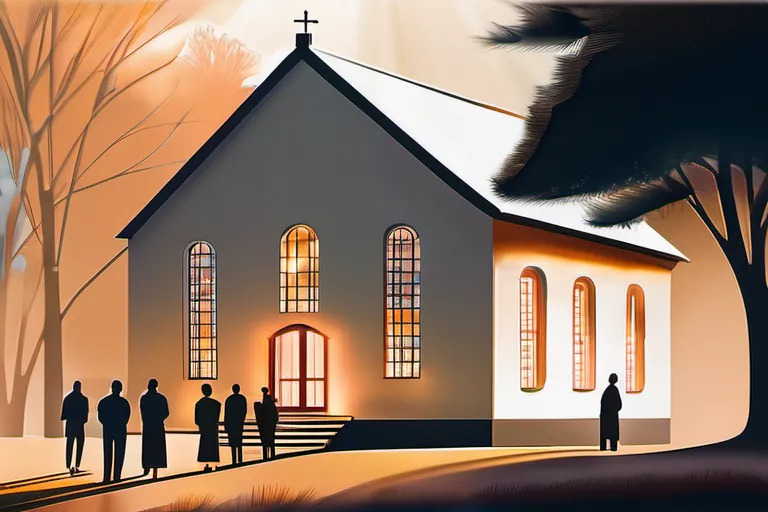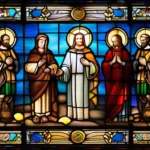Explore the history, beliefs, practices, and impact of Quakerism on society.
Quakerism, also known as the Religious Society of Friends, is a Christian denomination that originated in the 17th century. This article provides an in-depth look at its origins, core beliefs, unique practices, and the significant role it has played in shaping society.
The Origins of Quakerism
Imagine stepping back in time to the turbulent 17th century, where religious and social upheaval was the order of the day. In this era, one man’s quest for truth would spark a movement that would challenge established norms and beliefs. George Fox, born into a world torn by conflict between Catholicism and Protestantism, embarked on a personal journey to find spiritual fulfillment. He questioned the rigid dogmas of his time, asking why people should follow rules if they couldn’t understand them for themselves.
George Fox’s Vision was like a beacon in the dark, illuminating a path where each person could find their own way to God without the need for clergy or sacraments. He believed that everyone had access to The Inner Light, a divine presence guiding individuals towards moral and spiritual truth. This belief was revolutionary, as it suggested that no single church or leader held exclusive knowledge of salvation.
But why did Quakerism arise during this period? The social context played a crucial role. Puritan strictures were in place, and religious conformity was expected. When Fox spoke out against these restrictions, his words resonated with those seeking freedom of conscience. His message of simplicity and directness appealed to the marginalized and oppressed.
The emergence of Quakerism can be seen as a response to the crackling of social norms, much like lightning breaking through overcast skies. It challenged not just religious doctrines but also societal structures, advocating for equality and justice. This movement was more than a religious sect; it was a rebellion against the established order.
In essence, George Fox’s vision transformed from a personal search into a transformative force that would shape Quakerism. It is through his teachings and experiences that we can trace the origins of this unique faith, one that continues to inspire seekers of truth today.
Quaker Beliefs: The Inner Light
Imagine diving into the heart of Quakerism, where every person is seen as having a bit of God within. This central belief in what Quakers call the ‘Inner Light’ shapes their entire spiritual journey. How can such a simple idea so profoundly impact one’s life and perspective?
The Inner Light is more than just a concept; it’s a lived experience that guides Quaker practices and beliefs. Just as a lighthouse illuminates the path through treacherous waters, this inner light enlightens the soul, guiding each person to find their way in life. But how does one feel or understand this light?
In Quaker meetings for worship, silence plays a crucial role. It’s not an uncomfortable quiet, but a profound stillness that allows the Inner Light to be experienced more deeply. Imagine a room filled with people sitting in silence, waiting expectantly, like leaves on a tree awaiting the first drop of rain. Each person is quietly present, seeking their own light and listening for divine guidance.
The role of this silent worship cannot be overstated. It’s not just about waiting but actively engaging with the presence of the Holy Spirit. This practice fosters a deep sense of unity and equality among members, as everyone has equal access to the Inner Light. How does one discern what the light is asking? Through patient listening and reflection, Quakers believe they can hear God’s voice clearly.
The impact of this belief on Quaker communities is profound. It’s not just about personal salvation; it extends into a commitment to live ethically and compassionately in the world. From advocating for peace to working towards social justice, the Inner Light drives Quakers to make a positive difference wherever they go. How can you ignore such a powerful force within yourself?
So, as we explore further into Quakerism, remember that it’s more than a religion—it’s a way of life. The belief in the Inner Light transforms everyday actions and interactions, making every moment a sacred opportunity to connect with the divine. Will you join this journey? Or will you keep searching for answers?
Quaker Practices: Simplicity and Social Activism
Imagine walking into a Quaker meetinghouse, where the atmosphere is quiet and contemplative. How do you feel? Is it as if the world outside fades away, leaving only the presence of simplicity? For Quakers, simplicity isn’t just about wearing plain clothes or avoiding ostentatious displays; it’s a way of life that permeates every aspect of their existence.
Quakers reject hierarchical structures, viewing all members as equals under the guidance of The Inner Light. This belief in equality is reflected in their practices and is deeply intertwined with their commitment to social activism. Could you imagine a world where everyone’s voice carries equal weight? That’s what Quakers strive for.
Social activism, particularly around issues like peace, is a cornerstone of Quaker identity. They advocate strongly against war, seeing it as an unnecessary evil that tears at the fabric of society. How would your community benefit from such a focus on peace and reconciliation? Quakers believe in working towards solutions through dialogue and understanding rather than force or coercion.
Their commitment to simplicity extends beyond personal beliefs into their everyday actions. From shared meals around simple tables to communal decision-making processes, they strive for efficiency and minimalism without sacrificing effectiveness. Can you picture a world where resources are used more wisely, and the focus is on what truly matters?
Quakers also emphasize social justice, often aligning themselves with causes like abolition and later civil rights movements. Their history shows a consistent push against injustice, whether it’s slavery or discrimination based on race or gender. How do you think your community can learn from their example of standing up for what is right?
Their practices reflect a deep-seated belief in the worth and dignity of all people. By rejecting hierarchy and focusing on social activism, Quakers create an environment where everyone’s voice is heard and valued. It’s not just about changing the world; it’s about creating a society that values every individual.
The Spread of Quakerism: From England to the New World
From England to the American colonies, Quakerism has traveled a long and significant journey. Imagine if a beacon of light, metaphorically speaking, started its journey from the darkened corners of 17th-century England, slowly illuminating the path towards freedom and equality. This migration wasn’t just geographical; it was a profound shift in society’s fabric.
Quakers, also known as the Religious Society of Friends, began their trek across the Atlantic in the mid-17th century. Their journey was marked by persecution and relentless perseverance. They faced challenges such as the strict religious and social norms of their time, which often led to imprisonment, torture, and even death for those who dared to speak out against them. But why did they risk so much? The answer lies in their core beliefs: a direct, unmediated relationship with the Light within each person, emphasizing the belief that every human being is capable of experiencing divine truth.
Their arrival in America was more than just settling; it was a new beginning. Quakers established communities where they could practice their faith freely and challenge societal norms. In Pennsylvania, founded by William Penn, Quakers created a model society based on equality, pacifism, and religious freedom. This colony became a haven for those seeking refuge from persecution, not only Quakers but also other marginalized groups.
One of the most significant impacts of Quakerism in America was their role in the abolition of slavery. The Quaker perspective on the inherent worth and dignity of every person made them naturally opposed to the institution of slavery. They saw it as a contradiction to their beliefs, and they took action. In 1688, Quakers penned an anti-slavery statement, one of the earliest formal protests against the practice in America. How could they reconcile owning slaves with believing in the equality of all people?
Quakers also played pivotal roles in various social movements. Their commitment to peace and justice was evident during the American Revolution when many refused to take up arms or swear oaths, demonstrating their dedication to non-violent protest. In the 19th century, they were at the forefront of the abolitionist movement, supporting both African-American slaves and Native Americans.
Their influence extended beyond just America; Quaker ideals spread across continents and generations. They inspired other religious groups and social reformers, helping to shape a more equitable world. The migration of Quakers from England to the American colonies was not merely an expansion of geographical territory but a diffusion of transformative ideas that continue to resonate today.
Quaker Influence: Notable Figures and Movements
Imagine stepping into the quiet world of Quakerism, where simplicity and sincerity shape every aspect of life. How did this peaceful movement manage to leave such a profound impact on society? Let’s delve deeper into the lives of notable figures within Quakerism and explore their roles in significant social movements.
William Penn, often referred to as ‘the founder of Pennsylvania,’ stands out not just for his colony but also for his commitment to religious freedom. But did you know that he was deeply influenced by the Quaker belief in equality? His Frame of Government, which laid down the rules for governance in Pennsylvania, incorporated many progressive ideas, such as fair treatment of Native Americans and universal suffrage for men. How revolutionary it must have been to imagine a society where everyone had equal rights under the law!
Quakers played pivotal roles in various social movements, one of them being women’s suffrage. Mary Dyer, who was hanged as an early Quaker martyr, symbolized the courage required for reform. Fast forward to the 19th century, Lucretia Mott and Elizabeth Cady Stanton were at the forefront of the suffrage movement. Their activism stemmed from their Quaker beliefs in equality and justice. How powerful it must have been for them to see the fruits of their labor with women finally gaining the right to vote!
In the realm of civil rights, Franklin D. Roosevelt appointed Bayard Rustin, a Quaker, to organize the 1963 March on Washington for Jobs and Freedom. Rustin’s influence was significant in shaping the event, which became a defining moment in the civil rights movement. Can you imagine the impact of having such an organized and peaceful march, led by principles of equality and non-violence?
The Quaker legacy is woven into the fabric of modern society through these influential figures and their unwavering commitment to justice and equality. Their work serves as a reminder that even in times of adversity, one can make a difference with steadfast belief and action.
Quakerism Today: A Global Movement
Today, Quakerism is a global movement, weaving through diverse cultures and continents like a vibrant thread. Have you ever wondered how a small religious group in England over 300 years ago could have such far-reaching impacts today? The answer lies in its unique beliefs and practices that continue to resonate with people worldwide.
Quakers, also known as the Religious Society of Friends, are found in countries across the globe. From the United States to Nigeria, their communities vary widely but share core values of simplicity, peace, integrity, community, and equality. Each region adds its own flavor to this rich tapestry. In the Americas, Quakerism has deeply influenced social justice movements, while in Africa, it plays a significant role in education and healthcare.
One remarkable aspect is how Quakers adapt their practices to local contexts. For instance, in Japan, where there’s a strong emphasis on politeness and formality, Japanese Quakers have integrated these values into their worship and community work, creating a unique blend of traditional and modern expressions of faith. This flexibility highlights the strength of Quakerism as it spreads across different cultures.
Their ongoing contributions to society are profound. In many parts of the world, Quaker organizations focus on issues like poverty reduction, sustainable development, and conflict resolution. They often work in partnership with other non-governmental organizations (NGOs) and governmental bodies to make a tangible difference. How can we ignore their role in peace-building efforts around the globe? Their commitment to non-violence and justice is not just theoretical; it’s embodied in their actions every day.
As we look at Quakerism today, it’s clear that its impact extends far beyond its numbers. It continues to be a force for positive change, fostering communities that value mutual respect and understanding. The global movement of Quakers reminds us of the power of faith when it is lived out in practical ways. Who knew that a small group of people could inspire such wide-ranging and enduring efforts towards peace and justice?
From its origins in England to its current presence across the world, Quakerism has demonstrated resilience and adaptability. Its story is one of continuous evolution and growth, making it an important part of modern religious landscapes. As we navigate a complex and often challenging world, perhaps there are lessons for us all in how Quakers live out their faith.
Conclusion
 By understanding Quakerism’s history, beliefs, and practices, we gain a deeper appreciation for its enduring impact on religious thought and social activism.
By understanding Quakerism’s history, beliefs, and practices, we gain a deeper appreciation for its enduring impact on religious thought and social activism.











